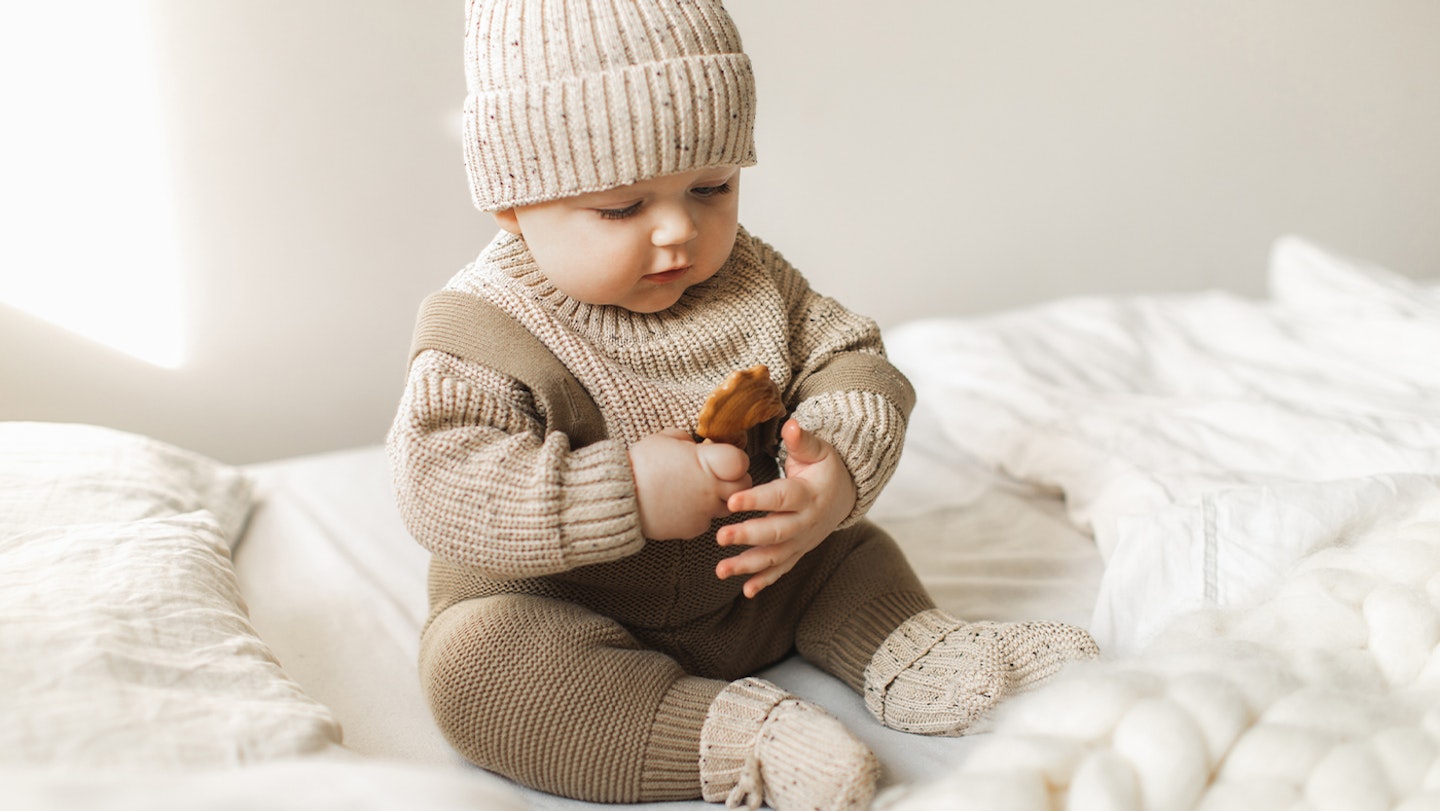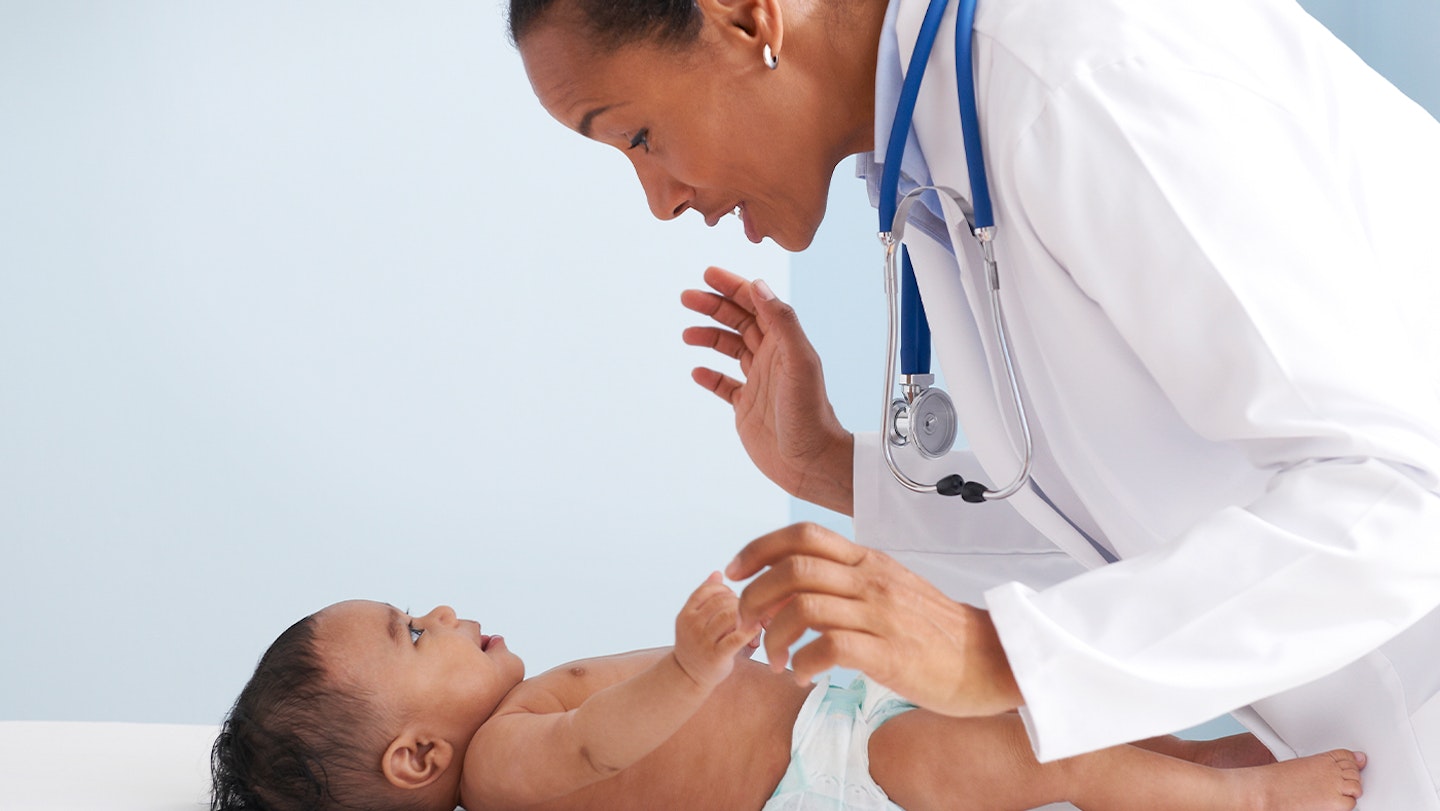
Medically Reviewed by: Dr José Costa, MD
Your 5-month-old baby is quickly hurtling towards their half-birthday - where has the time gone? Although it can feel overwhelming how fast time is going, it's exciting to watch your little bub develop their little personality and move towards lots of baby milestones. Here's what you can expect from your 5-month-old baby this month.
5-month-old baby development
Sleep: At five months your baby will probably be sleeping for around 12-16 hours per day with a few naps during the day and one longer stretch at night," says midwife and co-founder of The Baby Academy, Susan Hogan. "Every baby is different though, so don't worry if your little one's sleep schedule is a bit different. It is important to establish a consistent bedtime routine and create a comfortable sleep environment for your baby. This may include a dark room, a soothing white noise machine and a comfy crib or bassinet. As your baby grows their sleep needs may change so it's important to be flexible and adapt your baby's sleep routine as needed. Baby will still be sleeping in the same room as you at five months, and then from six months old, they can move into their own sleep space/nursery." Dr José Costa adds to this saying "10 hours of their sleep should be at night. They will have further two short naps during the day. Their patterns tend to follow a steady sleep-awake cycle."
Cognitive development: "Babies recognise their parents and familiar faces by five months and they are more socially aware of their surroundings, which can distract them whilst feeding. They start exploring their bodies, making and mimicking sounds, including speech and blowing bubbles." Says Dr Costa. "Your 5-month-old baby will be starting to make more sounds and may even be trying to say their first words. They'll also be using body language such as pointing and gesturing to communicate. As your baby grows they will be learning to understand more of what you are saying and they will start to respond to simple requests and commands." Explains Susan. According to Susan, you can encourage your baby's communication by talking, reading and singing to them and responding to their sounds and gestures as this will help to build a strong foundation for their language development. Dr Costa also adds, "if you haven’t already, now is a great time to take them to baby music and rhythm-time classes."

Physical development: "A baby’s ability to control their body increases and they start rolling. As their involuntary hand grasp decreases, they will be able to hold objects, examining them in the midline with both hands. As they control their heads better, they also start to look around, which also enables them to begin spoon feeding." Says Dr Costa. At five months of age, your baby may also be able to hold their head up well and may even be trying to sit up. "They'll also likely be able to reach for and grab toys and will be developing their hand-eye coordination," says Susan. "At this age, your baby's fine motor skills will be developing and they will be able to grasp and hold small objects with their hands. They may also be rolling over and learning how to crawl-your baby will be more active now, and may start to move around more on their own… so baby-proofing your home is now key!"
Feeding: At this age, your baby will be drinking a lot of milk. "Breastfed babies will continue to feed on demand. Formula-fed babies will be taking around 6-8 ounces (180-240mls) per feed and will be feeding around 5-6 times per day. It's generally recommended to wait until around six months before introducing solid foods, but every baby is different," Susan advises. "Breastmilk or formula provides all the nutrients that your baby needs. It's always best to talk with your Health Visitor or GP if looking for advice." Their growth will also depend on if your baby has started weaning or not, says Dr Costa. "If a baby is exclusively breast or bottle-fed, they will still need 150ml of milk, per kg per day. This volume will decrease depending on the number of solid feeds they have" he says.
5-month-old baby growth
"This will vary according to the size and the sex of the baby, but expect between 1.2 to 2.5 cm per month. By 4 or 5 months, your baby should have doubled their birth weight." Says Dr Costa. After their growth spurt at four months your baby will weigh around 12-16 pounds (approx. 5.5-7.5kg) and be around 26-28 inches (approx. 66-71 cm) long. "Every baby is different though, so don't worry if your little one is a bit smaller or larger," reassures Susan. "It is important to keep track of your baby's growth by monitoring their weight and length, but it's also important to remember that every baby develops at their own pace. Your 5-month-old baby's growth will be closely monitored by your Health Visitor or GP at regular check-ups so don't hesitate to ask any questions you may have about your baby's growth and development."
5-month-old baby health

According to Dr Costa, there are a few things for parents to keep in mind around this time when it comes to their baby's health. "In terms of development, parents should look for abnormal or absent fidgety movements, as this might be signs of neurological problems. Viral infections are common for babies, but parents also need to keep an eye out for more serious bacterial infections. Baby start teething around this time too, so be aware of common signs like drooling more, being unsettled or crying in pain."
Conjunctivitis: Also known as 'red eye' or 'pink eye', Conjunctivitis is a condition where the clear membrane covering your baby’s eyeball becomes red and inflamed. This is typically developed from a viral or bacterial infection or even an allergic irritation and will usually last between one and two weeks and go away on its own. If it's been longer than this or you are concerned your child might have an eye infection, you should contact your health visitor or GP.
Nappy rash: At one point or other, all babies experience nappy rash. This occurs when your baby’s skin becomes irritated due to prolonged contact with poo and wee. Thankfully you can easily ease your little one's discomfort by using a nappy rash cream.
Things to think about at 5 months
Play: Make sure to give your little one plenty of opportunities to explore and play as this is a crucial time for their development. Playtime is an essential part of your baby's development and it provides them with the opportunity to learn and discover new things. "Any age-appropriate toys that can stimulate their curiosity are great" says Dr Costa. "Colourful toys and musical toys for babies that make sounds, help babies to explore the world around and, by trying to reach them, they increase their motor skills."
Social skills: If you aren't already, it's a good idea to make sure your baby is around plenty of people which is why play groups or arranging playdates with young family members or friends' children is a great idea right now. "Interaction with babies of similar age and other adults will help them to develop their social skills" says Dr Costa. "Talking to your baby and trying to match verbal and facial expressions is also great for their development" he adds.
Baby proofing: You may notice that your little one is rocking on their stomach. By doing this, they are starting to practice those all-important muscle movements that are required to help them roll over. Soon they'll be trying to sit up and before you know it, trying to crawl! If you haven't already, you should consider baby-proofing your home.
Sleep routine: "Try to establish a consistent sleep schedule as this can help them (and you) get the rest they need," Susan suggests. "A consistent baby bedtime routine and sleep schedule can help your baby to establish healthy sleep habits and will also help you to plan your daily routine."
About the experts
Dr José Costa is a Consultant Paediatrician and fellow of the Royal College of Paediatrics and Child Health. He has over 16 years of experience in Paediatrics and over 12 years in Paediatric Allergy. Previously he led the Paediatric Allergy Services at University Hospitals Coventry & Warwickshire. Before that, he led the Paediatric Allergy Service at Sherwood Forest Hospitals NHS Foundation Trust.
This article contains expert advice from midwife and co-founder of The Baby Academy, Susan Hogan. Sue’s main mission in all of the work she does is "supporting new families, helping them to feel confident and in control during their pregnancy, their birth and as they grow as a family unit."
A journalist since 2015, Emily Gilbert is the Features & Reviews Editor for Mother&Baby and has written for the website and previously the magazine for seven years. Emily writes about everything from the top baby products to pregnancy, fertility and maternal mental health. Specialising in product reviews, Emily is the first to know about all the exciting new releases in the parenting industry.
